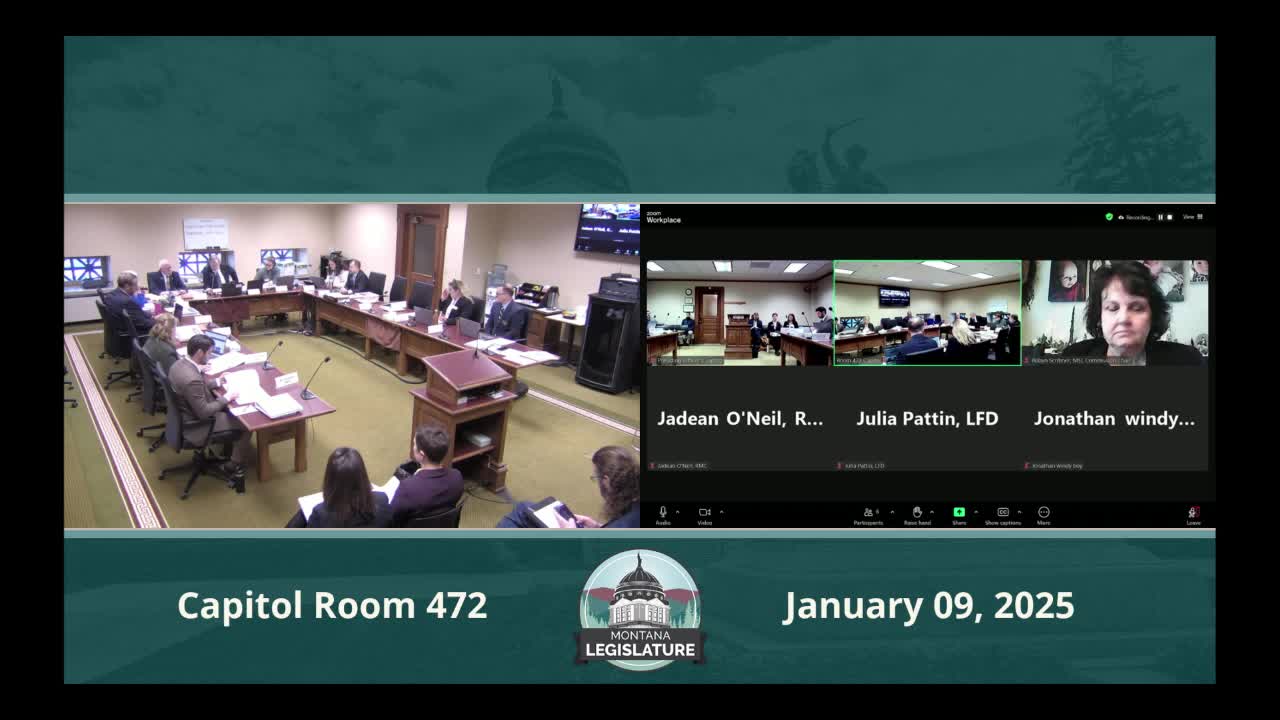Legislative fiscal staff and State Librarian outline budget, warn of declining recording-fee revenue and proprietary fund growth
Get AI-powered insights, summaries, and transcripts
Subscribe
Summary
Legislative fiscal staff presented the Montana State Library’s House Bill 2 and proprietary fund budgets and highlighted a revenue decline in the Montana Land Information (recordation fee) account; State Librarian Jenny Stapp and the library commission described services and supported a planned "deep dive."
Legislative fiscal staff told the Joint Appropriations Subcommittee on Education that the Montana State Library’s 2027 biennium House Bill 2 budget request is roughly $778,000, or about 5 percent, above the fiscal year 2025 base, and they flagged a decline in revenues to the Montana Land Information state special revenue account that may require legislative action.
Julia, a Legislative Fiscal Division analyst, walked the committee through the agency’s House Bill 2 tables and the separate proprietary fund analysis. She said the statewide present-law personal services adjustment (DP 1) for the state library accounts for much of the HB2 increase; the DP 1 package for fiscal year 2026 was about $196,000, of which roughly $78,000 were legislative changes (benefits and longevity) and about $118,000 were management changes (reclassifications and hiring at different rates). "Of the $196,000 decision package for fiscal year 2026, about $78,000 of that was legislative changes and about 118,000 was management changes," she said.
Julia pointed to the Montana Land Information account as a legislative action item: recording fees rose from $0.75 to $1.50 in fiscal year 2022, producing one-time revenue that funded projects such as the Montana Real Time Network. Those additional collections were used as one-time funding in the 2021 and 2023 legislative sessions, and recent declines in recorded documents have reduced revenues. Julia said about $1.5 million of unexpended authority in fiscal year 2024 was attributable to lower land-recordation fees. The Legislature may choose to (1) adjust appropriations to match anticipated revenues and increase funding from another source, (2) reduce appropriations to align with anticipated revenues, or (3) adopt the executive budget as requested.
The fiscal analyst described the library’s funding mix: general fund supports about half of the agency’s operations; state special revenue includes the Montana Land Information account (recordation fees) and a coal severance tax library account that receives 0.93 percent of coal severance collections; federal special revenue includes the Institute of Museum and Library Services (IMLS) Library Services and Technology Act formula grant (2-to-1 federal-state match required); and proprietary funds include enterprise accounts such as the Montana Shared Catalog and the Montana State Reference Network (formerly called the Real Time Network).
The fiscal division’s proprietary-fund review showed a 2027 biennium proprietary request of approximately $105,000 (about 8.4 percent above the fiscal 2025 base). The Montana Shared Catalog is an enterprise cooperative of about 180 libraries that pays member fees under an agreed cost formula; its expenditures include software licensing, staffing (2.62 FTE), indexing and training. The Montana State Reference Network is a statewide GNSS-based positioning service with subscriber fees that cover operations; the state library had appropriated $500,000 per fiscal year in the 2025 biennium for start-up and ongoing costs, but that funding was largely one-time and will not carry forward automatically to 2027.
State Librarian Jenny Stapp, the library commission chair Robin Scribner, and other library staff described services the agency provides and supported a detailed review. "We really look forward to working with you and are happy to answer any questions you have," Stapp said. She highlighted the library’s three functional categories used in the fiscal review — central services; patron and local library development services; and GIS data and information programs — and emphasized services including the talking book library, resource sharing (interlibrary loans and the Libby app), the Montana Cadastral application, Montana Natural Heritage Program data, hotspot lending for broadband access, and the Montana Field Guide. "The Montana State Library collects and stores the public's information and makes it available to everyone," she told the committee.
Chair Beatty said the committee will use the next two days to do a "deep dive" into the library’s budget and operations. He asked the library to be prepared to show how it will prioritize activities if revenue streams fall and to describe mitigation strategies. The chair also signaled an intent to model the library’s budget into multiple programs rather than a single program request: "It is my intention ... to decompose your programs into at least 3 modeled after the ones that you've already described," he said.
Public testimony: Sarah Widger, president of the Montana Library Association, testified in support of the state library and urged the committee to continue funding that supports centralized contracts, resource sharing and local libraries’ services. Robin Scribner, chair of the State Library Commission, thanked the legislature for prior support and urged funding to cover inflationary and ongoing operational increases.
What to watch: The committee will question the library on priorities and trade-offs during the deep dive and may consider legislative action to address the declining recordation-fee revenues or to reallocate funding across programs. The committee also asked the budget office, library staff and fiscal analysts to confer about fixed-rate assessments for the digital library services account and report back on options for House Bill 2.
